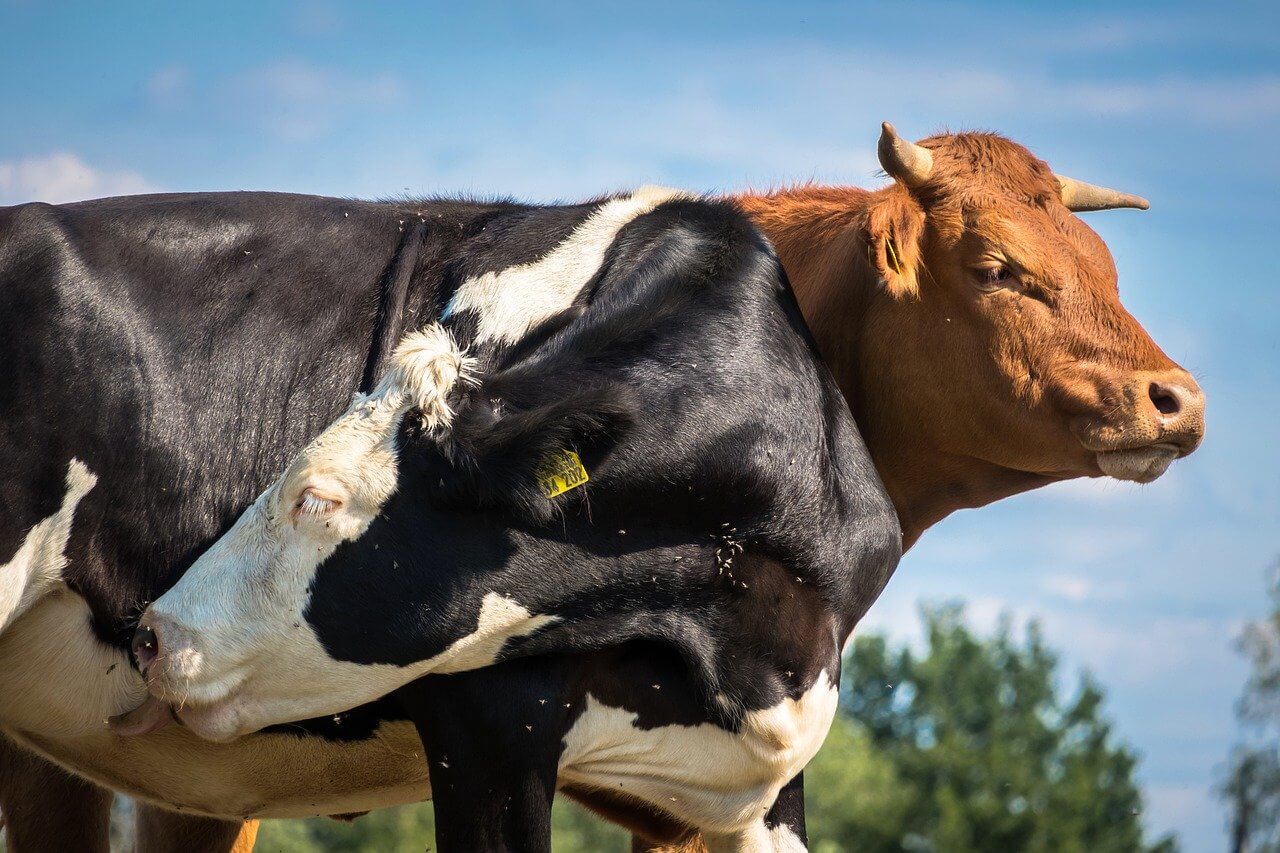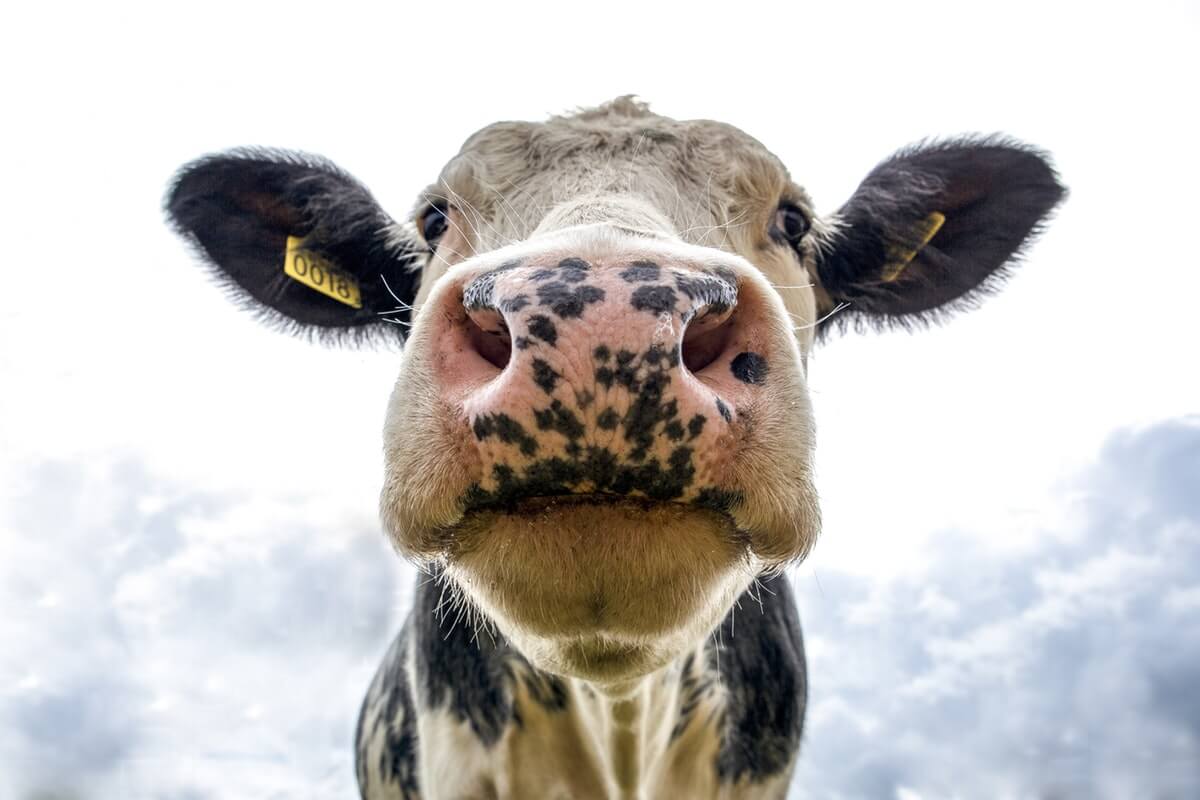Springtime is the best time to deworm cattle. Early in the springtime, parasite loads are very heavy in pastures. They tend to reduce during the summertime and then they rise again in the autumn. So how often should you worm cattle?
You can’t always tell by looking when your cows are infected with parasites. You may notice subclinical signs such as a decrease in milk production; a slowing down of weight gain and even a reduction in conception rates.
If left untreated, these subclinical effects will evolve into clinical effects which may include problems such as edema, anemia and poor coat condition. Both subclinical and clinical effects negatively impact your bottom line and your cattle’s health, so it’s important to keep on top of parasite infestation.
What You'll Learn Today
How Often Do You Need To Deworm Cattle?

Frequency of deworming depends on a number of factors, including the type of parasite load your cattle are exposed to and the type and age of the cattle you have.
Mature cattle should be dewormed annually in the springtime. Pregnant cows should be dewormed just before calving.
Keep in mind that a pregnant cow is under a great deal of stress at calving time. This can mean that her immune system is suppressed, and this can make her more susceptible to parasite infestation.
Oddly enough, bulls are more susceptible to parasites than cows, so you should probably worm them twice a year. If your pasture has an especially large parasite load, you may need to deworm your cattle two times yearly.
Calves also need to be wormed more frequently than mature cows. Calves that are given deworming treatments while nursing are usually heavier as weanlings. Three or four month old calves should receive their first deworming treatment.
The second treatment should come when the calf is weaned from its mother. Following this second deworming, you can expect to treat calves once every three or four months until they become yearlings.
After this point, you should deworm in the springtime and again in the autumn until your calves are fully grown.
Read also: Tips For Raising Wagyu Cattle
Technically speaking, heifers are not thought of as fully mature until they have borne one calf and are pregnant with the second calf.
What Types Of Cattle Dewormers Are Best?

When selecting a product to use, keep these five considerations in mind:
- Method of Application: Will administration of this product be practical for you?
- Spectrum of Control: Does the product you are considering offer protection against all of the prevalent pests in your area?
- Cost-Effectiveness: Will administering this remedy fit into your budget easily?
- Withdrawal Time: How long must you wait after administering the product before you can milk or slaughter your stock?
- Product Efficacy: Does the product come highly recommended by your vet, county agent and/or local farmers and ranchers?
You can choose from avermectins/milbemycins or benzimidazoles. These active ingredients are available in a number of different types of commercial products.
The first group, avermectins/milbemycins , is good for use in calves. It acts as a dewormer and also provides control for external parasites.
Benzimidazoles are effective against trematode and nematode infections. They also have some effectiveness against cestodes.
Unfortunately, these pests have developed some resistance to these chemicals in recent years, but there are some more effective chemicals available.
Among these are:
- Albendazole Sulfoxide
- Triclabendazole
- Thiabendazole
- Fenbendazole
- Oxibendazole
- Mebendazole
- Flubendazole
- Oxfendazole
- Albendazole
- Thiophanate
- Netobimin
- Febantel
Talk with your veterinarian and/or your local county agent to determine which chemical will work best with your animals, on your property and in your area.
Your extension agent can let you know about variables and cost-effectiveness and special considerations, such as fluke control.
Streamline Your Deworming Plan To Suit Your Specific Needs

Strategies for deworming vary quite a bit from place to place. Be sure to consult your local ag extension for pinpointed advice about deworming strategies in your climate.
Generally speaking, in the United States, your springtime deworming schedule should roughly follow this guideline:
- In the deep South, provide deworming on March 1.
- In the central United States, deworm between March 1 and April 15.
- In the northern United States, deworm between April 15 and May 15.
In the autumn, you should deworm every bovine on your property prior to the first freeze or killing frost. If this has not happened by late November, go ahead and do your fall deworming.
Administer Dewormers Carefully
No matter what type of product you choose, you should always be careful to follow packaging directions to the letter.
Remember that with all types of pest control products, the label is the law. If you use deworming products incorrectly, you run the risk of enabling parasites to develop resistance.
If you are unable to weigh each animal in your herd, base your dosage on the weight of the largest animal.
Institute An Integrated Pest Management (IPM) System
The bottom line is that you should not skimp on deworming. Keeping your cattle healthy is the key to your success. Take your time when developing a strategy for your climate, your property and your cattle.
Manage manure promptly and effectively. Composting is an excellent way to prevent having your manure pile become a pest pile.
Avoid parasite infestation by avoiding overgrazing. When cattle grazed to closely, they take in more parasite larvae.
By combining effective pasture management and effective deworming treatment, you can keep parasites under control.
Why Should Cattle Producers Deworm?
Frequently Asked Questions
The illness and failure-to-thrive that parasites can cause cattle is far more costly than a good deworming program. Internal parasites can cause a loss of at least $200 per head in the animals’ lifetime. If parasite infestation causes serious illness, even greater monetary losses will result.
Cattle that are infested with parasites will experience symptoms such as loss of appetite and subsequent weight loss. Dairy cattle will produce less milk. Breeding herds may experience difficulty breeding and conceiving. Calves may fail to thrive or may simply weigh less at the time of weaning. Parasites weaken an animal’s immune system and cause susceptibility to disease.
This is a term used for a combination strategy that involves a number of steps. First, take fecal samples and determine the count of parasite eggs in the samples. Next, decide upon the type and amount of deworming product needed to deal with the problem at hand. Finally, use the product at the right time to both deal with the infestation and prevent further parasite reproduction. For example, it’s smart to treat your herd early in the springtime before turning them out to pasture. This will help prevent having parasites flourish and spread in the grazing area. Treat your cattle again in the autumn to deal with any parasites they may have picked up while grazing.
You can use a strategy called selective non-treatment to prevent having entire generations of parasites evolve to complete dewormer resistance. To do this, you would perform frequent fecal tests and only worm as needed, worm only high risk animals (e.g. grazing calves and heifers), rotate types of deworming products and always use the maximum allowable dosage for the weight of the animal.
Deworming products that can be added to feed are considered non-handling dewormers. These may be in the form of liquid, pellets or may be added as a standalone powder or in a combination product that also delivers minerals and other nutrients. It is also possible to get products such as protein blocks and range cubes that are infused with deworming products.
Well, I think the answer depends a lot on where they live and which type of cattle you raise. Is it right?